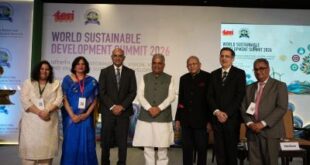Will Stem projected 25% Yield Loss and Farmer Vulnerability
- Calls for farmer-first, tech-driven solutions to tackle gaps in adoption despite government push
- Showcases NICRA’s impact to empower farmers through 23,000 capacity-building programmes
- Urges targeted subsidies for renewable energy, organic inputs, and micro-irrigation to make climate-smart practices more accessible to small and marginal farmers
New Delhi, 5 June 2025: On the occasion of World Environment Day, the Federation of All India Farmer Associations (FAIFA), a non-profit uplifting the cause of millions of farmers and farm workers involved in commercial crop cultivation in states such as Uttar Pradesh, Gujarat, Maharashtra, Andhra Pradesh, Telangana, and Karnataka, organised a national seminar on the theme “Supplementing Farmer Income through Sustainable Farming Practices” at the Constitution Club of India in New Delhi. The seminar outlined a sustainable approach to leverage proven climate-resilient technologies to empower farmers.
During the seminar, FAIFA also unveiled a white paper titled “Nourishing the Future: A Report on Climate-Resilient Agriculture”. The report lauded the success of ICAR’s flagship NICRA initiative, which has reached nearly 6.93 lakh farmers as of February 2025, through technology demonstrations and has trained 6.47 lakh stakeholders via 23,613 capacity-building programmes on climate resilient agriculture. As part of its interventions, 448 Climate Resilient Villages have been established, and 650 district-level agricultural contingency plans have been developed.
The report’s focus is in line with the latest developments initiated by the Government of India to boost agriculture. Some of the key efforts include the launch of the Digital Agriculture Mission, the continuation of the Pradhan Mantri Fasal Bima Yojana and the National Mission on Natural Farming.
Delegates in the seminar, including policymakers, agricultural scientists, and Members of Parliament, expressed concern over projections by the Indian Network for Climate Change Assessment (INCCA), which estimate a potential 6–25% reduction in wheat yields and a 3–15% decline in rice yields by 2050. The FAIFA report also highlights a study by the International Crops Research Institute for the Semi-Arid Tropics (ICRISAT) that warns of 10–30% fall in rain-fed crop yields across semi-arid regions.
Erratic Climate Conditions – A Threat to Agriculture
The report underscores that climate change, no longer a distant threat but a present and accelerating crisis for Indian agriculture, is beefing up its siege through erratic rainfall, unseasonal droughts, temperature spikes, and rising incidence of pests and diseases disrupting crop cycles. These weather events have severely impacted productivity, inflated input costs, and choked farmer incomes — compounding their distress. Small and marginal farmers, who form over 80% of India’s agrarian community, are the worst affected due to limited adaptive capacity.
But schemes such as the Pradhan Mantri Fasal Bima Yojana (PMFBY), which provides insurance cover for weather-beaten crop losses, and initiatives under the Per Drop More Crop component that scale micro-irrigation are alleviating farmer distress. Additionally, the Soil Health Card scheme and the Paramparagat Krishi Vikas Yojana (PKVY) have supported balanced nutrient management and organic farming.
Though a robust policy foundation is in place, the report identifies several gaps in implementation. High initial costs, fragmented infrastructure, and low farmer awareness continue to block widespread adoption of climate-resilient technologies. FAIFA recommends an integrated remedy: scaling research and extension services, expanding digital agri-platforms, and incentivizing sustainable practices.
Mr. Murali Babu, General Secretary, Federation of All India Farmer Associations (FAIFA), said, “In states like Andhra Pradesh, Karnataka, Maharashtra, and Uttar Pradesh, tangible impacts of climate variability on farming are becoming increasingly evident. Soil degradation, rising input costs, and falling water tables are putting significant pressure on farm productivity and incomes, particularly for small and marginal farmers. However, initiatives like ICAR’s NICRA programme are encouraging, which has introduced practical climate-resilient solutions, such as solar-powered irrigation, drought-tolerant seed varieties, and capacity-building at the grassroots. These are already making a difference in many regions. This report is a constructive call to deepen our commitment to sustainable agriculture. We must transition from a ‘grow more’ approach to a ‘grow better’ mindset—one that embraces innovation, environmental stewardship, and economic viability for the farming community.”
Innovation on the Ground: Success Stories from the Field
The report features examples of climate-smart agriculture practices that are already providing greener outcomes:
- Precision farming using IoT, sensors, and mobile-based advisories helps farmers monitor soil moisture, optimise inputs, and pre-empt crop stress.
- Regenerative agriculture, including crop rotation, green manuring, and cover cropping, is enhancing long-term soil health.
- Integrated Nutrient Management (INM) is reducing fertiliser dependency while maintaining yield levels.
- NICRA’s flood – and drought-tolerant crop varieties are emerging as adaptive lifelines for climate-vulnerable farmers.
Such sustainable soil conservation practices also contribute to carbon sequestration, as they act as mitigation pathways aligned with India’s broader climate goals.
Mr. Ather Matheen, Vice-President, Federation of All India Farmer Associations (FAIFA), said, “Sustainable agriculture must be viewed as a core economic strategy for Indian farmers and not just be seen as an environmental or regulatory concern. Climate-resilient models offer long-term financial benefits by lowering input costs, opening new markets, and reducing weather-related disruptions. Initiatives such as the Agriculture Infrastructure Fund can drive long-term income growth for farmers while advancing sustainability across the agricultural value chain. We also see transformative potential in platforms like e-NAM, which are beginning to streamline market access and improve price discovery through digital trade. As these tools evolve and scale, they will play a crucial role in integrating farmers more effectively into national and global value chains.”
FAIFA’s Reform Roadmap: Building Resilience Through Policy and Practice
To address systemic challenges, the report puts forward suggestions for an effective roadmap:
- Increase public investment in R&D for climate-resilient seed varieties and cropping systems
- Widen farmer training programmes through participatory models and grassroots extension services
- Promote ICT-based tools for precision agriculture and timely farmer advisories
- Strengthen market access for sustainable produce by linking incentives with adoption
- Provide targeted subsidies for renewable energy, micro-irrigation, and organic inputs
- Mainstream conservation agriculture, agroforestry, and integrated farming systems into national and state programmes
Climate-Resilient Agriculture is the Way Forward
The report makes a fervent appeal to policymakers, research institutions, and private stakeholders to collaborate in scaling climate-smart agriculture. By infusing modern science into traditional knowledge, strengthening grassroots capacity, and aligning economic incentives, the sector can be bolstered to become resilient to climactic extremes and ensure a sustainable future for itself.
As India works towards the twin imperatives of ensuring food security and combatting climate change, FAIFA’s report offers a timely and actionable roadmap. FAIFA concludes that with strong institutional backing, increased investment, and a farmer-first implementation model, India can pave the way for an agri-economy that is both productive and climate-resilient.
 Newspatrolling.com News cum Content Syndication Portal Online
Newspatrolling.com News cum Content Syndication Portal Online






